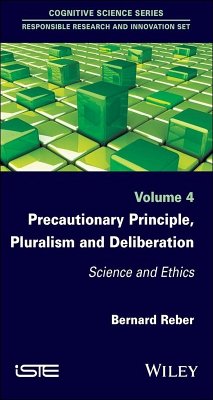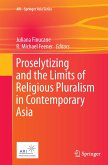- Gebundenes Buch
- Merkliste
- Auf die Merkliste
- Bewerten Bewerten
- Teilen
- Produkt teilen
- Produkterinnerung
- Produkterinnerung
This volume tackles the burden of judgment and the challenges of ethical disagreements, organizes the cohabitation of scientific and ethical argumentations in such a way they find their appropriate place in the political decision. It imagines several forms of agreements and open ways of conflicts resolution very different compared with ones of the majority of political philosophers and political scientists that are macro-social and general. It offers an original contribution to a scrutinized interpretation of the precautionary principle, as structuring the decision in interdisciplinary…mehr
Andere Kunden interessierten sich auch für
![Juries, Science and Popular Culture in the Age of Terror Juries, Science and Popular Culture in the Age of Terror]() Juries, Science and Popular Culture in the Age of Terror81,99 €
Juries, Science and Popular Culture in the Age of Terror81,99 €![Philosophies of Integration Philosophies of Integration]() Adrian FavellPhilosophies of Integration125,99 €
Adrian FavellPhilosophies of Integration125,99 €![Post-Marxist Alternatives Post-Marxist Alternatives]() Nicos P. MouzelisPost-Marxist Alternatives35,99 €
Nicos P. MouzelisPost-Marxist Alternatives35,99 €![Philosophies of Integration Philosophies of Integration]() Adrian FavellPhilosophies of Integration81,99 €
Adrian FavellPhilosophies of Integration81,99 €![Philosophies of Integration Philosophies of Integration]() Adrian FavellPhilosophies of Integration125,99 €
Adrian FavellPhilosophies of Integration125,99 €![Lonergan on Philosophic Pluralism Lonergan on Philosophic Pluralism]() Gerard WalmsleyLonergan on Philosophic Pluralism92,99 €
Gerard WalmsleyLonergan on Philosophic Pluralism92,99 €![Proselytizing and the Limits of Religious Pluralism in Contemporary Asia Proselytizing and the Limits of Religious Pluralism in Contemporary Asia]() Proselytizing and the Limits of Religious Pluralism in Contemporary Asia89,99 €
Proselytizing and the Limits of Religious Pluralism in Contemporary Asia89,99 €-
-
-
This volume tackles the burden of judgment and the challenges of ethical disagreements, organizes the cohabitation of scientific and ethical argumentations in such a way they find their appropriate place in the political decision. It imagines several forms of agreements and open ways of conflicts resolution very different compared with ones of the majority of political philosophers and political scientists that are macro-social and general. It offers an original contribution to a scrutinized interpretation of the precautionary principle, as structuring the decision in interdisciplinary contexts, to make sure to arrive this time to the "Best of the Worlds".
Hinweis: Dieser Artikel kann nur an eine deutsche Lieferadresse ausgeliefert werden.
Hinweis: Dieser Artikel kann nur an eine deutsche Lieferadresse ausgeliefert werden.
Produktdetails
- Produktdetails
- Verlag: Wiley
- Seitenzahl: 298
- Erscheinungstermin: 27. Dezember 2016
- Englisch
- Abmessung: 236mm x 160mm x 20mm
- Gewicht: 590g
- ISBN-13: 9781786301000
- ISBN-10: 1786301008
- Artikelnr.: 45721352
- Herstellerkennzeichnung
- Libri GmbH
- Europaallee 1
- 36244 Bad Hersfeld
- gpsr@libri.de
- Verlag: Wiley
- Seitenzahl: 298
- Erscheinungstermin: 27. Dezember 2016
- Englisch
- Abmessung: 236mm x 160mm x 20mm
- Gewicht: 590g
- ISBN-13: 9781786301000
- ISBN-10: 1786301008
- Artikelnr.: 45721352
- Herstellerkennzeichnung
- Libri GmbH
- Europaallee 1
- 36244 Bad Hersfeld
- gpsr@libri.de
Bernard REBER, Senior Fellow in the Center National for the Scientific Research (CNRS), Sciences Po Paris, (Political Research Center).
Preface ix
Acknowledgments xv
Introduction xvii
Part 1. Pluralism between Ethics and Politics in the Context of Prevention
1
Introduction to Part 1 3
Chapter 1. Burdens of Judgment and Ethical Pluralism of Values 11
1.1. The "burdens of judgment" at the root of the "fact of reasonable
pluralism" 13
1.2. Burdens of judgment: a critique 17
1.2.1. Burdens of judgment: a starting point, not an obstacle 17
1.2.2. The variable geometry of pluralisms 22
1.3. Ethical pluralism of values, from relativism to monism 26
1.4. Relativisms and commitments 32
1.4.1. Three types of relativism 32
1.4.2. Commitments in response to values 33
1.5. Opposing monism: conditionality, incompatibility and
incommensurability of values 36
1.6. Conclusion: decompartmentalizing conflicts of values 38
Chapter 2. Ethical Pluralism of Ethical Theories at the Heart of
Evaluation 43
2.1. Ordinary morality, anti-theory and skepticism 44
2.2. What is an ethical theory? 47
2.3. Main ethical theories 50
2.4. Pluralism in practical reasoning 55
2.4.1. Formal practical reasoning 56
2.4.2. Substantial practical reasoning 58
2.5. Interactions between normative factors and foundational normative
theories 60
2.6. Conclusion: conflicts and deliberation in the context of ethical
theories 64
Chapter 3. Deliberative Democracy Put to the Test of Ethical Pluralism 71
3.1. Participatory exposure 72
3.2. Rawls and Habermas: opposing views in support of deliberation 74
3.2.1. Rawls: restricted ethics 75
3.2.2. Habermas: reliance on undefined arguments 77
3.3. Deliberating in a democracy 80
3.4. Desperately seeking arguments... 85
3.5. Conclusion: pluralism of moral and political philosophers 88
Conclusion to Part 1: Mapping the "Should-be" of the Public Sphere 95
Part 2. Ethical and Political Pluralism in a Context of Precaution 105
Introduction to Part 2 107
Chapter 4. Deciding on, and in, Uncertainty Using the Precautionary
Meta-principle 113
4.1. Careless criticisms of the precautionary principle 116
4.2. Precautionary principle: components and trigger factors 122
4.3. To act, or not to act 126
4.4. Clashing scenarios and "grammars" of the future 129
4.5. Typology of political decisions in the context of uncertainty 132
4.6. Conclusion: the deliberative as genre for uncertain futures 135
Chapter 5. Between Sciences and Ethics: A New Quarrel of Faculties? 143
5.1. Scientists between attachment and independence 144
5.2. Politics of nature 152
5.3. The prominent role of values in paradigm changes 160
5.4. Relationships between scientific facts, epistemic values and ethical
values 162
5.5. Conclusion: a Republic of Letters dealing with facts and values 165
Chapter 6. Co-argumentation in a Context of Disciplinary Pluralism 173
6.1. Epistemic pluralism and competitive positions 177
6.2. Tensions and cooperation due to pluralism internal and external to
disciplines 180
6.3. Types of argumentation and dialogue 184
6.4. Co-dependence between ethical argumentation and scientific
investigation 191
6.5. Confrontation of hypotheses 194
6.6. Conclusion: structuring of inter- and intra-disciplinary pluralisms
thanks to the precautionary meta-principle 200
Conclusion 207
Bibliography 225
Index 245
Acknowledgments xv
Introduction xvii
Part 1. Pluralism between Ethics and Politics in the Context of Prevention
1
Introduction to Part 1 3
Chapter 1. Burdens of Judgment and Ethical Pluralism of Values 11
1.1. The "burdens of judgment" at the root of the "fact of reasonable
pluralism" 13
1.2. Burdens of judgment: a critique 17
1.2.1. Burdens of judgment: a starting point, not an obstacle 17
1.2.2. The variable geometry of pluralisms 22
1.3. Ethical pluralism of values, from relativism to monism 26
1.4. Relativisms and commitments 32
1.4.1. Three types of relativism 32
1.4.2. Commitments in response to values 33
1.5. Opposing monism: conditionality, incompatibility and
incommensurability of values 36
1.6. Conclusion: decompartmentalizing conflicts of values 38
Chapter 2. Ethical Pluralism of Ethical Theories at the Heart of
Evaluation 43
2.1. Ordinary morality, anti-theory and skepticism 44
2.2. What is an ethical theory? 47
2.3. Main ethical theories 50
2.4. Pluralism in practical reasoning 55
2.4.1. Formal practical reasoning 56
2.4.2. Substantial practical reasoning 58
2.5. Interactions between normative factors and foundational normative
theories 60
2.6. Conclusion: conflicts and deliberation in the context of ethical
theories 64
Chapter 3. Deliberative Democracy Put to the Test of Ethical Pluralism 71
3.1. Participatory exposure 72
3.2. Rawls and Habermas: opposing views in support of deliberation 74
3.2.1. Rawls: restricted ethics 75
3.2.2. Habermas: reliance on undefined arguments 77
3.3. Deliberating in a democracy 80
3.4. Desperately seeking arguments... 85
3.5. Conclusion: pluralism of moral and political philosophers 88
Conclusion to Part 1: Mapping the "Should-be" of the Public Sphere 95
Part 2. Ethical and Political Pluralism in a Context of Precaution 105
Introduction to Part 2 107
Chapter 4. Deciding on, and in, Uncertainty Using the Precautionary
Meta-principle 113
4.1. Careless criticisms of the precautionary principle 116
4.2. Precautionary principle: components and trigger factors 122
4.3. To act, or not to act 126
4.4. Clashing scenarios and "grammars" of the future 129
4.5. Typology of political decisions in the context of uncertainty 132
4.6. Conclusion: the deliberative as genre for uncertain futures 135
Chapter 5. Between Sciences and Ethics: A New Quarrel of Faculties? 143
5.1. Scientists between attachment and independence 144
5.2. Politics of nature 152
5.3. The prominent role of values in paradigm changes 160
5.4. Relationships between scientific facts, epistemic values and ethical
values 162
5.5. Conclusion: a Republic of Letters dealing with facts and values 165
Chapter 6. Co-argumentation in a Context of Disciplinary Pluralism 173
6.1. Epistemic pluralism and competitive positions 177
6.2. Tensions and cooperation due to pluralism internal and external to
disciplines 180
6.3. Types of argumentation and dialogue 184
6.4. Co-dependence between ethical argumentation and scientific
investigation 191
6.5. Confrontation of hypotheses 194
6.6. Conclusion: structuring of inter- and intra-disciplinary pluralisms
thanks to the precautionary meta-principle 200
Conclusion 207
Bibliography 225
Index 245
Preface ix
Acknowledgments xv
Introduction xvii
Part 1. Pluralism between Ethics and Politics in the Context of Prevention
1
Introduction to Part 1 3
Chapter 1. Burdens of Judgment and Ethical Pluralism of Values 11
1.1. The "burdens of judgment" at the root of the "fact of reasonable
pluralism" 13
1.2. Burdens of judgment: a critique 17
1.2.1. Burdens of judgment: a starting point, not an obstacle 17
1.2.2. The variable geometry of pluralisms 22
1.3. Ethical pluralism of values, from relativism to monism 26
1.4. Relativisms and commitments 32
1.4.1. Three types of relativism 32
1.4.2. Commitments in response to values 33
1.5. Opposing monism: conditionality, incompatibility and
incommensurability of values 36
1.6. Conclusion: decompartmentalizing conflicts of values 38
Chapter 2. Ethical Pluralism of Ethical Theories at the Heart of
Evaluation 43
2.1. Ordinary morality, anti-theory and skepticism 44
2.2. What is an ethical theory? 47
2.3. Main ethical theories 50
2.4. Pluralism in practical reasoning 55
2.4.1. Formal practical reasoning 56
2.4.2. Substantial practical reasoning 58
2.5. Interactions between normative factors and foundational normative
theories 60
2.6. Conclusion: conflicts and deliberation in the context of ethical
theories 64
Chapter 3. Deliberative Democracy Put to the Test of Ethical Pluralism 71
3.1. Participatory exposure 72
3.2. Rawls and Habermas: opposing views in support of deliberation 74
3.2.1. Rawls: restricted ethics 75
3.2.2. Habermas: reliance on undefined arguments 77
3.3. Deliberating in a democracy 80
3.4. Desperately seeking arguments... 85
3.5. Conclusion: pluralism of moral and political philosophers 88
Conclusion to Part 1: Mapping the "Should-be" of the Public Sphere 95
Part 2. Ethical and Political Pluralism in a Context of Precaution 105
Introduction to Part 2 107
Chapter 4. Deciding on, and in, Uncertainty Using the Precautionary
Meta-principle 113
4.1. Careless criticisms of the precautionary principle 116
4.2. Precautionary principle: components and trigger factors 122
4.3. To act, or not to act 126
4.4. Clashing scenarios and "grammars" of the future 129
4.5. Typology of political decisions in the context of uncertainty 132
4.6. Conclusion: the deliberative as genre for uncertain futures 135
Chapter 5. Between Sciences and Ethics: A New Quarrel of Faculties? 143
5.1. Scientists between attachment and independence 144
5.2. Politics of nature 152
5.3. The prominent role of values in paradigm changes 160
5.4. Relationships between scientific facts, epistemic values and ethical
values 162
5.5. Conclusion: a Republic of Letters dealing with facts and values 165
Chapter 6. Co-argumentation in a Context of Disciplinary Pluralism 173
6.1. Epistemic pluralism and competitive positions 177
6.2. Tensions and cooperation due to pluralism internal and external to
disciplines 180
6.3. Types of argumentation and dialogue 184
6.4. Co-dependence between ethical argumentation and scientific
investigation 191
6.5. Confrontation of hypotheses 194
6.6. Conclusion: structuring of inter- and intra-disciplinary pluralisms
thanks to the precautionary meta-principle 200
Conclusion 207
Bibliography 225
Index 245
Acknowledgments xv
Introduction xvii
Part 1. Pluralism between Ethics and Politics in the Context of Prevention
1
Introduction to Part 1 3
Chapter 1. Burdens of Judgment and Ethical Pluralism of Values 11
1.1. The "burdens of judgment" at the root of the "fact of reasonable
pluralism" 13
1.2. Burdens of judgment: a critique 17
1.2.1. Burdens of judgment: a starting point, not an obstacle 17
1.2.2. The variable geometry of pluralisms 22
1.3. Ethical pluralism of values, from relativism to monism 26
1.4. Relativisms and commitments 32
1.4.1. Three types of relativism 32
1.4.2. Commitments in response to values 33
1.5. Opposing monism: conditionality, incompatibility and
incommensurability of values 36
1.6. Conclusion: decompartmentalizing conflicts of values 38
Chapter 2. Ethical Pluralism of Ethical Theories at the Heart of
Evaluation 43
2.1. Ordinary morality, anti-theory and skepticism 44
2.2. What is an ethical theory? 47
2.3. Main ethical theories 50
2.4. Pluralism in practical reasoning 55
2.4.1. Formal practical reasoning 56
2.4.2. Substantial practical reasoning 58
2.5. Interactions between normative factors and foundational normative
theories 60
2.6. Conclusion: conflicts and deliberation in the context of ethical
theories 64
Chapter 3. Deliberative Democracy Put to the Test of Ethical Pluralism 71
3.1. Participatory exposure 72
3.2. Rawls and Habermas: opposing views in support of deliberation 74
3.2.1. Rawls: restricted ethics 75
3.2.2. Habermas: reliance on undefined arguments 77
3.3. Deliberating in a democracy 80
3.4. Desperately seeking arguments... 85
3.5. Conclusion: pluralism of moral and political philosophers 88
Conclusion to Part 1: Mapping the "Should-be" of the Public Sphere 95
Part 2. Ethical and Political Pluralism in a Context of Precaution 105
Introduction to Part 2 107
Chapter 4. Deciding on, and in, Uncertainty Using the Precautionary
Meta-principle 113
4.1. Careless criticisms of the precautionary principle 116
4.2. Precautionary principle: components and trigger factors 122
4.3. To act, or not to act 126
4.4. Clashing scenarios and "grammars" of the future 129
4.5. Typology of political decisions in the context of uncertainty 132
4.6. Conclusion: the deliberative as genre for uncertain futures 135
Chapter 5. Between Sciences and Ethics: A New Quarrel of Faculties? 143
5.1. Scientists between attachment and independence 144
5.2. Politics of nature 152
5.3. The prominent role of values in paradigm changes 160
5.4. Relationships between scientific facts, epistemic values and ethical
values 162
5.5. Conclusion: a Republic of Letters dealing with facts and values 165
Chapter 6. Co-argumentation in a Context of Disciplinary Pluralism 173
6.1. Epistemic pluralism and competitive positions 177
6.2. Tensions and cooperation due to pluralism internal and external to
disciplines 180
6.3. Types of argumentation and dialogue 184
6.4. Co-dependence between ethical argumentation and scientific
investigation 191
6.5. Confrontation of hypotheses 194
6.6. Conclusion: structuring of inter- and intra-disciplinary pluralisms
thanks to the precautionary meta-principle 200
Conclusion 207
Bibliography 225
Index 245








